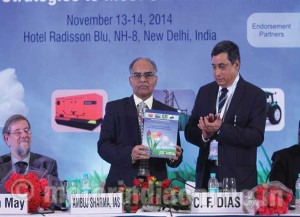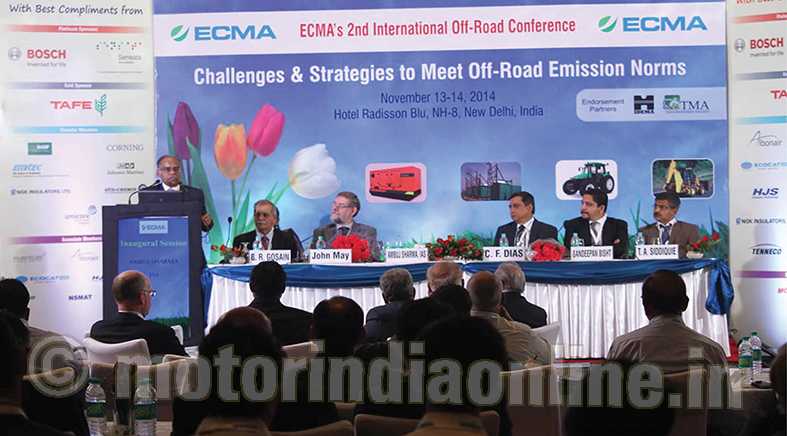At the inaugural session of ECMA’s off-road conference are (from left) Mr. Ambuj Sharma, Additional Secretary, DHI, Mr. B.R. Gosain, ECMA Executive Director, Mr. John May, Technical Director, AECC, Brussels, Mr. C.F. Dias, Vice President, Mr. Sandeepan Bisht, Treasurer, and Mr. T.A. Siddiquie, Chairman, Event Management Committee, ECMA
The Emission Controls Manufacturers Association (ECMA) organised the 2nd International Off-Road Conference on “Challenges and Strategies to meet Off-Road Emission Norms” in New Delhi on November 13 and 14. The conference started with the welcome address by Mr. C.F. Dias, Vice President, ECMA, followed by the opening remarks made by Mr. T.A. Siddiquie, Chairman, ECMA Event Management Committee.
Mr. Ambuj Sharma, Additional Secretary, DHI, the chief guest on the occasion inaugurating the conference, appreciated the efforts and contribution of ECMA and its members for emission control in on-road and off-road applications, and stated that, in view of the growing number of vehicles in off-road areas such as mining, construction, agricultural, etc., there is need for more attention to be paid to this segment.
Over 250 delegates participated in the deliberations on issues such as future non-road emission legislation, its impact on the market, strategic vision and drivers for emission reduction of genset engines, opportunities & challenges for the Indian non-road machinery market, best available technology pathways to meet stringent off-road emission norms, etc.
Most speakers highlighted the challenges related to introduction of electronics in engines, diagnostics & infrastructure requirements, packaging, training of personnel, improvement in manufacturing facilities, end users to handle new systems, etc. They also spoke on India’s unique requirements, market readiness, harmonization with global regulations, generator set, engine aftertreatment design considerations, etc.

The participants also focused on public health and environment impact. The concerns of component suppliers were highlighted. Adaptation or redesign of engines, machines and their components in the context of more stringent emission limits, the need for substantial research and development effort and production cost increase may affect manufacturers, importers and exporters of engines and non-road machinery and their employees, etc. There is therefore a need for stronger NRMM emissions standards in India, both to improve air quality and for OEMs’ competitiveness in other markets.
The winner of ECMA’s second Global Learning Initiative was invited to make presentation on her research project. The best project was awarded a cheque of Rs. 1 lakh along with Certificate by Mr. Nitin Gokarn, CEO & Project Director, NATRiP. The second best project was awarded a cheque of Rs. 75,000 along with Certificate.
The unique challenges of off-road applications are usages of diesel-powered equipment in a variety of applications. The broad range of engine sizes, types, size of equipment and power ratings, opting design configurations for a power category, infrastructural development for the CEV industry, and creation of funds for the same, risk mitigation strategies, opportunities for new innovation frontiers, manufacturing capacities, localization footprint of enabling technologies, supply chain readiness, equipment price escalation and the cost of ownership impact on the customer viability were discussed in detail. Important technologies like SCR, EGR, ceramic substrate & filter, system integration of SCR & DPF, vaporizer technologies for active DPF regeneration, generation of engine technology and their calibrations, etc., for off-road vehicles were also deliberated upon.
The closing panel on “Implementation Challenges for Greener Off-road Transportation in India” chaired by Dr. R.K. Malhotra, ECMA Adviser, discussed several key issues and suggested some important steps to be taken up with the stakeholders and legislative authorities.
The market for off-road equipment has diverse challenges. The technologies are available for emission control, but the choice of the right technology at the right cost is the key. During times of low fuel prices, the Government may charge higher excise duty rather than reducing prices which should be utilized to improve the fuel quality.
The other issues covered were lubricants and additives, the need for more testing facilities, collaboration with research institutes and academia, and the need for a fast track approach and collective efforts by the Government, OEMs, emission control technology equipment manfacturers and users, without which the purpose will not be served.
